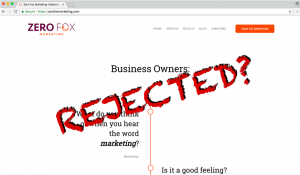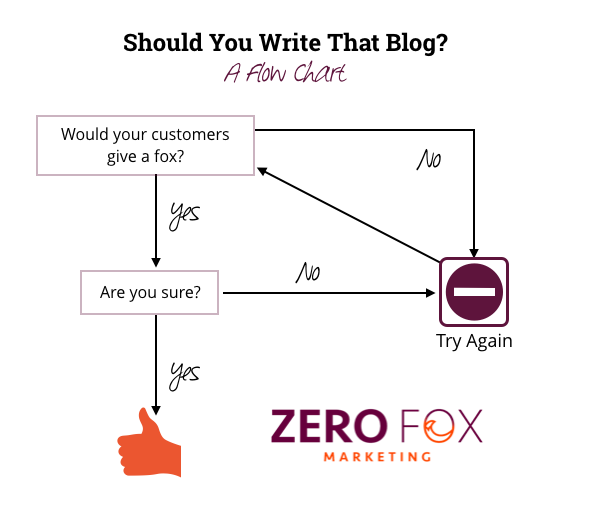I knew my own company’s website had “arrived” when I got my first email with some grave news.
Apparently, I have a gigantic SEO problem.

According to some online marketing company, my website looks great. But unfortunately, it is not search engine friendly at all. They offered me a free report of all my SEO issues, plus help getting on “Page 1” of Google, Yahoo, and Bing.
I also got an email telling me that I could earn more than $15,000 per day via blogging and affiliate marketing.
This makes me laugh, because:
- I started getting these emails just as my new domain started to gain search engine traction (ironic),
- They appear to originate from organic searches (also ironic), and
- I think we all need to quit our day jobs and become affiliate blogger/marketers.
“Your Site is Not SEO Friendly,” and Other Scare Tactics
I’ve had prospective clients say that they get multiple emails per week about how much their websites suck when it comes to search engines. They mostly ignore them, but in some cases, they have internalized the notion that their site is all wrong in the eyes of Google. That makes them nervous.
But it may or may not be true. It also may or may not be what they need to focus on for better results.
Don’t get me wrong. SEO is an important thing. I recently helped a client move to a more search-friendly eCommerce platform that fixed some key issues. They saw a 40% increase in traffic from search engines nearly immediately, and a five-year high for June revenue only a month after launch. SEO does matter.
But in other cases, there’s more to the story. I’ve seen clients that flat out don’t have the issues that these emails claim. I’ve also seen clients with other marketing needs that were far more important to overall results than traditional SEO.
So How Do You Know If Your Website is Indeed Bad for Search Engines?
And how do you know how big of a problem it is? Here are a few strategies and tips.
1. Get Google Analytics (and Search Console)
Between Google Analytics and Google Search Console (formerly Google Webmaster Tools), you can get a pretty good idea of how much search engine traffic your site is getting, what terms you rank for, and at what rate your organic traffic converts.
There is no “magic number” for any of the above, but if you read and understand the data, that’s the first step. You’ll be armed with hard facts about how your site is performing in the search engines, instead of just notions or guesses. Then you can make a plan from there.
2. Remember that Search Engines try to Mimic People
Google’s main goal is to please people: to anticipate their behavior, to serve things that are relevant to them, and to satisfy them. It’s how Google makes money and thrives.
So if someone is trying to give you SEO advice that’s more concerned with meta tags and “optimization” than content and what makes sense for your customer, run.
And, if they’re recommending a course of action without even knowing how your site/company is actually performing, run even farther.
3. There is More to Online Marketing than Search
First place in a search engine for a prime keyword is 1) rarely attainable, especially for smaller and mid-size companies, and 2) not the only thing you need to worry about.
Even if you operate in a niche where a high rank is possible, what happens when a customer gets to your site from the search engine?
Getting some data (as described above) is the first step to figuring out what areas will give you the most bang for your marketing buck. But then you need to think about that data in the context of your overall marketing performance before you decide whether or not to hire an SEO company. Remember to problem-solve holistically to achieve the best results and marketing plan possible.
Need an Objective Opinion?
I’ll make no judgements until we know the facts, and I’ll tell you if your website sucks (ha!) without trying to sell you anything. Feel free to contact me for help.




About The Author: Christina Ousouljoglou
I'm a results-focused, data driven go-getter. I help clients turn marketing headaches into understandable business strategies that work.
More posts by Christina Ousouljoglou